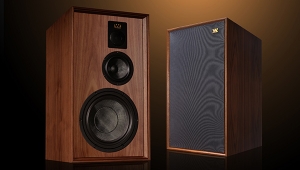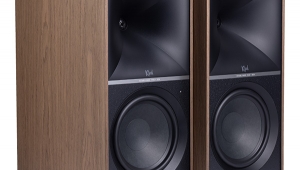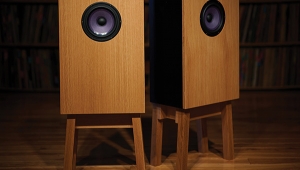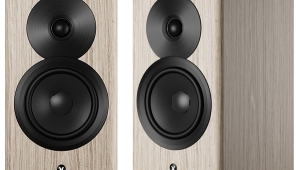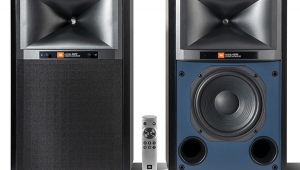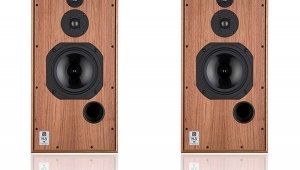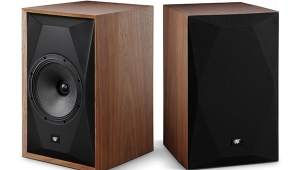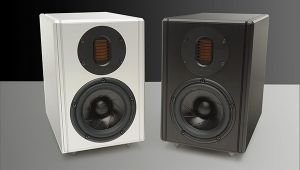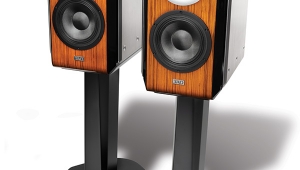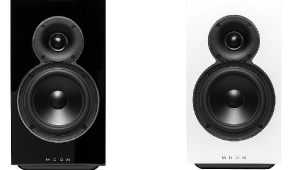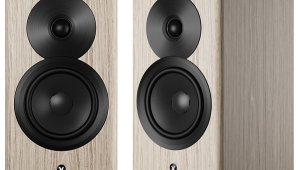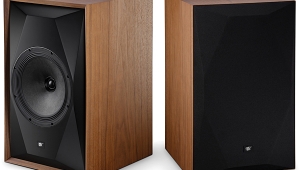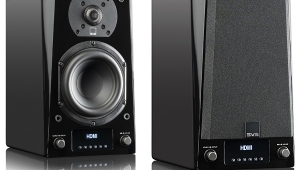| Columns Retired Columns & Blogs |
Revel Performa M20 loudspeaker Page 2
Per my usual practice, I coupled the speakers to the stands' top plates with small pads of Blu-Tack. I measured and auditioned the M20s with their U-shaped speaker grilles off—the speakers looked striking, their black baffles and aluminum woofer cones standing in contrast to the rosewood veneer. However, as the grilles are quite minimal in their design, they shouldn't affect the sound much, if at all.
Before setting up the M20s, I spent some time with the Revel Ultima Studios, one of Stereophile's two 2001 "Loudspeakers of the Year." At $10,995/pair and up, the Studio offers full-range low frequencies among its notable achievements. So when I started listening to the comparatively tiny Performas, I expected a dramatic reduction in bass. I didn't hear it. The massive organ underpinning the choir and orchestra in King's College Chapel, Cambridge, in "Land of Hope and Glory," from Elgar's Coronation Ode (EMI CMS 7 64209 2), seemed to be present pretty much in full measure, as were the organ pedals in the JVC XRCD re-release of Saint-Saëns' "Organ" Symphony (Charles Munch/BSO, JMCXR-0002), which "purred" satisfyingly in the poco adagio slow movement. I could clearly hear, thus appreciate the doubling of the pedal at the lower octave in this movement before and after the pizzicato string interlude. No, the room didn't shake as it had with the Studios, but the music was still allowed to communicate.
But two woofers, each with a radiating diameter of 4.5", can't achieve miracles. Going back to the Studio revealed that, yes, there was more low bass present with the big speaker, and it would play the low octaves to much higher levels. However, with the usual low-frequency reinforcement offered by rooms of small to moderate size—particularly when, like mine, they have solid wall construction—the M20 offered enough bass extension to sound bigger than it really is. The warble-tone tracks on Stereophile's Test CD 3 (STPH006-2) revealed the speaker to offer genuine extension to the 40Hz band, with my room acoustics then boosting the 32Hz and 25Hz bands. The 20Hz band was basically inaudible.
The M20's port was notably free from any air "chuffing" noises during these tests, but what was also noticeable, both with the warble tones and with the half-step-spaced tonebursts on Test CD 3, was how clean the Revel's bass reproduction was, how free from overtones and overhang. This implies both low distortion and a relative freedom from resonant cabinet colorations. However, the speaker is a ported design, and even though it didn't have the rather exaggerated reflex tuning that I heard from the Joseph RM33si (see this issue's "Follow-Up"), the M20 didn't have that last vestige of bass definition that you get from an optimally aligned or even slightly overdamped sealed-box design. Stanley Clarke's closely miked double-bass on "Nevermind" (Test CD 3) came over as slightly too "woofy," though this was not unpleasant. (I don't think any dealer has ever lost a sale because a speaker's lows were balanced to be a little too generous in absolute terms.)
The "clean" nature of the Revel's presentation extended higher in frequency. The M20's midrange was both free from coloration and exceptionally revealing of recorded detail. The subtle differences in the depth and definition of the image due to the different mike techniques in the "Mapping the Soundstage" track on Test CD 3 were clearly audible. In fact, it was this clarity, coupled with its stable, precise stereo imaging, that made me decide to use the M20s for most of the monitoring during the mixing and mastering of Cantus' Let Your Voice Be Heard CD (see feature article elsewhere in this issue). The spatial and tonal effects of very slight changes in the mix between the two disparate microphone pairs, or the amount and type of equalization, were clearly audible.
The lack of midband coloration made the M20 a natural choice for playback of piano recordings. As I write these words, I'm enjoying András Schiff's superbly natural recording of Janácek's piano works (ECM 1736). Jed Distler wrote in the December 2001 issue (p.163) that Schiff's performances "benefit from robust, full-bodied engineering that your high-end speakers will adore." The Revels certainly did "adore" this disc; I don't think I have heard recorded piano sound this free from strain or grain, other than from very much more expensive speakers. The left-hand register was weighty without any boominess, and the subtle details of the piano sound, such as the way the harmonic structure changes as a note dies away, were readily apparent.
- Log in or register to post comments
